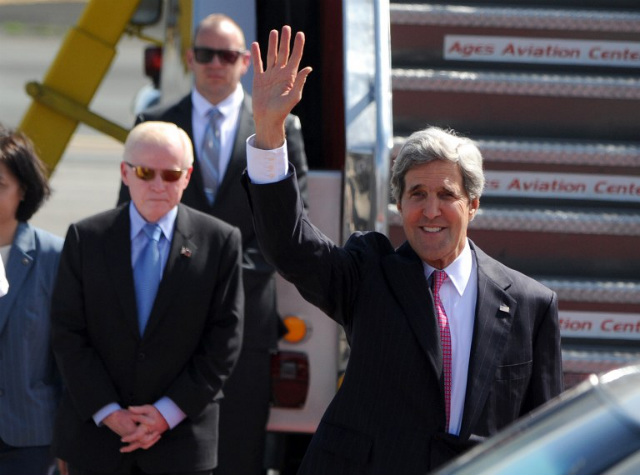SUMMARY
This is AI generated summarization, which may have errors. For context, always refer to the full article.

MANILA, Philippines – US Secretary of State John Kerry slammed China as passé on Tuesday, December 17, as he supported the Philippines’ move to bring the rising superpower to court over their maritime dispute.
Kerry, who is in the Philippines for a two-day visit, said China should “see the wisdom” of subjecting itself to international law.
In a joint media briefing with Philippine Foreign Secretary Albert del Rosario, Kerry cited the Philippines’ case against China to settle their dispute over the West Philippine Sea (South China Sea).
China has consistently rejected this arbitral process, and has insisted on bilateral talks instead.
“I hope that ultimately, the leaders in China will see the wisdom of engaging in that activity, and work through any claims in those institutions and through those laws that were set up specifically to resolve those kinds of claims,” Kerry said.
“In this day and age, we should be long past the time of unilateral assertion and coercion as a means of trying to back up that assertion,” he added.
Kerry hailed the Philippines, its strategic partner, for filing the unprecedented case against China. He said the US “will stand with our friends in the region” who resolve maritime disputes in a “legal and peaceful process.”
“I think what’s important is to lower the intensity, avoid the provocations, work through international law, and for the claims, to stay united, and to press international law as the means of resolving this. In my judgment, that is the best way to proceed,” Kerry said. (Watch more in the video below.)
China’s air defense zone
He also warned China against imposing an air defense zone over the South China Sea, similar to one it declared over disputed islands in the East China Sea.
“Today, I raised our deep concerns about China’s announcement of an East China Sea air defense identification zone,” Kerry said, referring to his discussions with Del Rosario. “I told the foreign secretary that the United States does not recognize that (East China Sea) zone and does not accept it.”
Kerry stressed that the zone “should not be implemented and China should refrain from taking similar, unilateral actions elsewhere in the region, and particularly over the South China Sea.” (Watch more in the video below.)
Beijing’s East China Sea air defense zone requires aircraft to provide flight plans when traversing the area, declare their nationality and maintain two-way radio communication, or face “emergency defensive measures.”
The zone covers disputed Tokyo-controlled islands – known as Senkaku in Japan and Diaoyu in China – where ships and aircraft from the two countries already shadow each other.
The Philippines warned last month that China’s announcement of an Air Defense Identification Zone (ADIZ) in the East China Sea raised the prospect of it doing the same for the South China Sea.
Scarborough dispute
It was Kerry’s first time to visit the Philippines as secretary of state. (Watch scenes from Kerry’s visit below.)
His visit came as tensions between the Philippines and China have risen in recent years. This, after Beijing became more forthright in asserting its claim over most of the potentially resource-rich South China Sea.
Earlier this year, Manila took Beijing to a United Nations tribunal over the contested Scarborough Shoal, which lies about 220 kilometers (135 miles) from the Philippines’ main island of Luzon and has been occupied by Chinese vessels since last year.
In December, the Philippines’ lawyer in its case against China said Manila needs an “impeccable” judgment against Beijing. This will pressure it to take a “more flexible position” on maritime disputes, said the Philippines’ lead counsel, Paul Reichler. (READ: PH lawyer on China: Being ‘int’l outlaw’ has its price.)
“Part of the explanation is that there is a heavy price to pay for a state that defies an international court order, or a judgment of an arbitral tribunal that is seen, that is recognized, in the international community as legitimate, as fair, as correct, as appropriate,” Reichler said in a forum hosted by the US-based Center for Strategic and International Studies. – with reports from Agence France-Presse/Rappler.com
Add a comment
How does this make you feel?





There are no comments yet. Add your comment to start the conversation.